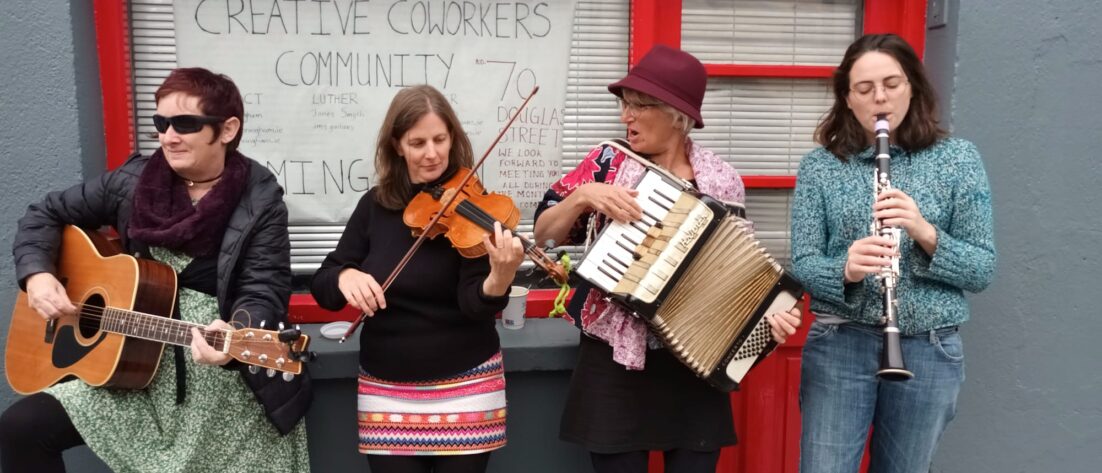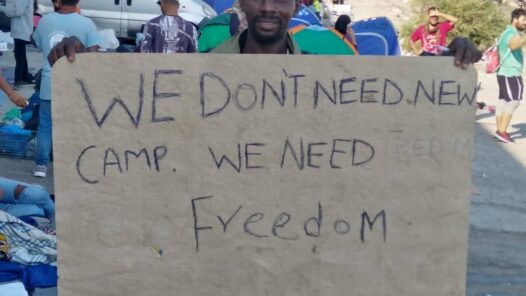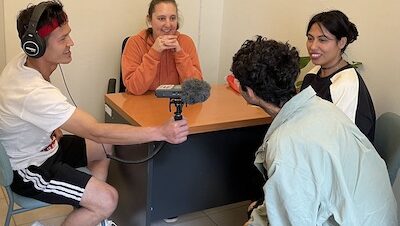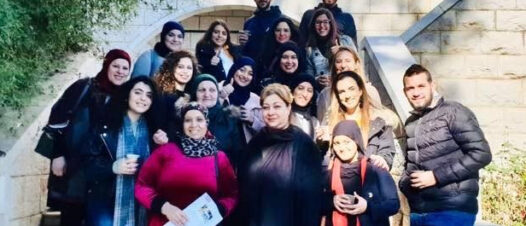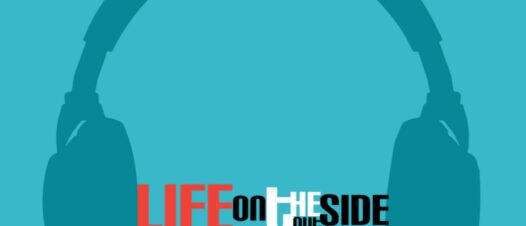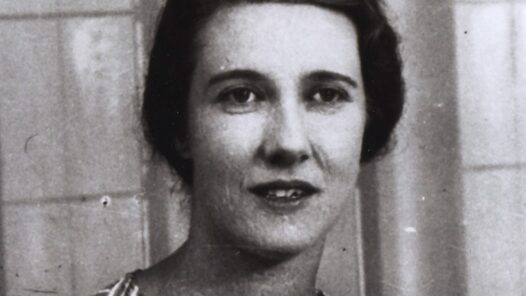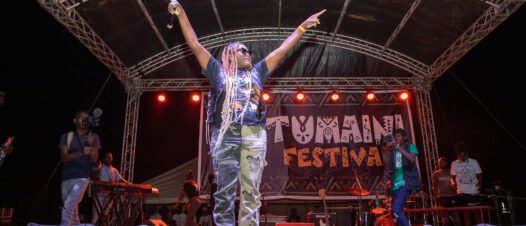An exploration of Jewish Irish history and culture – from Deli 613, to the Irish Jewish Museum: historians, musicians and Jewish groups and individuals share different aspects of modern Jewish culture in Ireland.
‘Jews have been here since the time of the Normans. Jews are not strangers here, but they remain to be othered in a lot of ways. And that, to me, is very interesting. Why, after a thousand years, why is there still this othering?’
– Dr. Melanie Brown
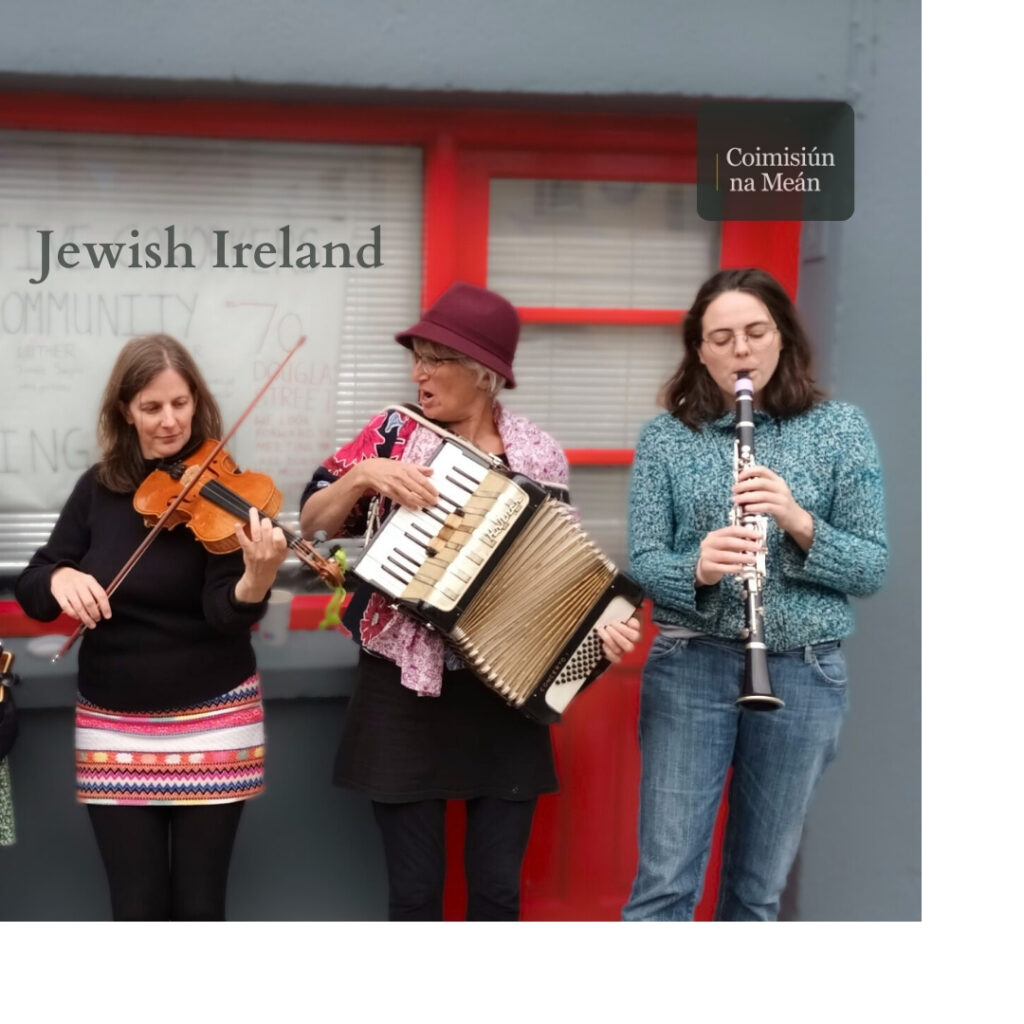
pic: courtesy Ruti Lachs
Edwin Alkin talks us through the various artefacts, photographs and exhibitions at the Irish Jewish Museum in Dublin, and explains some of the history of Jewish people in Ireland. Dr. Melanie Brown tells us what she learnt from her involvement with the Jewish Oral History Project and the Inter-Faith Council – and what it means to her to be Irish and Jewish.
Rabbi Zalman Lent and Rifky Lent at Deli 613 – the first kosher deli in Dublin in fifty years – share Jewish food and explain why they set up and how they’ve been received by the community. And then we head to Cork to meet klezmer composer Ruti Lachs, of the Cork Jewish Community and we’ll get her take on being one of the ‘new Irish’ Jews who’ve made Ireland their home.
Produced by Bairbre Flood for Documentary on Newstalk and funded by Coimisiun na Mean under the Sound and Vision Scheme.
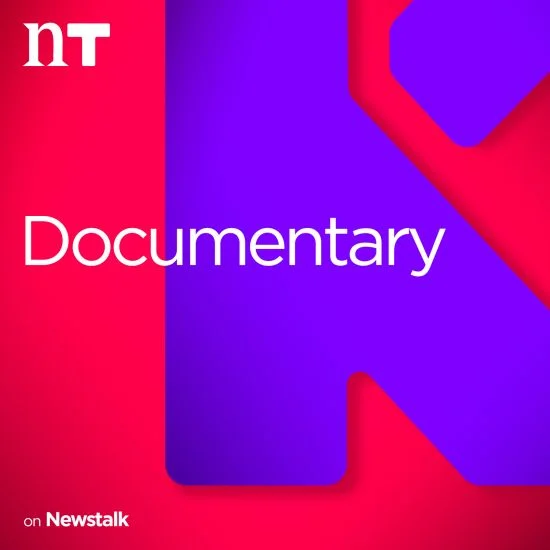
Transcript:
[00:00:00] Bairbre Flood: I’m here in Portobello, Dublin at the Irish Jewish Museum.
[00:00:19] Edwin Alkin: Hi, I’m Edwin Alkin. I’m the chairman of the museum and volunteer and I’m here to speak to you today. You’re very, very welcome.
Our museum is set in what used to be the Jewish Quarter of Dublin. And it’s in an old synagogue, which closed in the 1960s, lay empty for many years, and then opened as a museum in 1985.
[00:00:47] Bairbre Flood [narrator]: It’s a real old school building, packed full of photos and maps of the Jewish cemeteries, synagogues, rabbis, and members of the various Jewish communities over the years.
[00:01:00] MUSIC
Bairbre Flood: Who are these ?
[00:01:00] Edwin Alkin: They’re just little ornaments of an old European man, a Jewish man and his wife. And an artist representation of a little old couple, as they would have looked in Russia or in Poland living in a small village quite humble and And so on. I, they’re quirky things and somebody must have given them as a gift to the museum.
[00:01:25] Bairbre Flood [narrator]: Although small numbers of Jewish people came to Ireland earlier on. The first permanent community arrived in the 16th century as refugees from the Catholic Inquisition in Spain and Portugal in 1555. William Ananyas, a Portuguese Jewish refugee became mayor of Cobh in County Cork.
[00:01:47] Edwin Alkin: Are you looking at the plate or the book?
[00:01:49] Bairbre Flood: The book.
[00:01:49] Edwin Alkin: The book. The book is a reproduction of the oldest Sephardic Haggadah in the world. Haggadah is the, the little booklet that is, prayer [00:02:00] book that is read at Pesach time, Passover time. And this one is known as the Sarajevo Haggadah. And if, as I said, the oldest Sephardic Haggadah in the world. It has the name Sarajevo because that’s where it is living now.
However, it was written and drawn in Barcelona in 1350. When the Jews had to leave Spain and Portugal in 1492, I’m guessing it went with them. Every page is illuminated. Very interesting. They’ve authenticated the paper to look old and parchment like. And it happens to be open at the page which says Pesach which is Passover on the right hand side and Matzah.
So Matzah is the special food that is eaten on Passover. So it’s been there since this Passover as a demonstration.
[00:02:52] Bairbre Flood [narrator]: The Jewish people have been expelled from France, Germany, Hungary and other countries on many occasions throughout the 12th to 15th centuries, and they were also forcibly exiled from Ireland under the British ruler Edward I, who banned Jewish people in 1290.
This is a constant thread winding through the history of Jewish people in Ireland, with the largest influx being in the 19th century, with the pogroms and persecutions in Eastern Europe and Russia.
[00:03:22] Edwin Alkin: The new community that arrived here, fleeing persecution, discriminatory laws and practices, and they had very good reason to leave.
And they were lucky, of course they were, because when the Germans went on the march of the Second World War about 190,000 Jews were murdered in Lithuania, so our ancestors were lucky to have left earlier. So when they came to this part of the world, they settled here, and particularly in Dublin.
So between 1850 and 1900, the Jewish population went from 450 people from the census to 3,000. At one stage, the community had about nine or ten kosher shops, and they were on Clonbrassil Street. For kosher meat, which is not far from here, very much a Jewish street with Jewish businesses, butcher shops, baker shops, candlestick makers, bookshops you, you name it, every kind of shop and the people from this community, this, they established their businesses down there, one of them was the Bretzel, which I think you’re going to go to, which is a bread shop with a very distinguished tradition, producing special bread.
And one by one those shops closed as the population dwindled in size, until there was none left. But the last shop was this lady here, Baila Erlich. And she ran the last kosher butcher on Clonbrassil Street in Dublin until around about 2001 when she died.
[00:04:53] Bairbre Flood [narratior]: Edwin Alkin shows me some beautiful paintings by Estella Solomons, two of which were borrowed by the National Gallery for a recent exhibition.
[00:05:04] Edwin Alkin: And they borrowed this picture from us and… It’s her father, her mother and her sister in the garden, a sunny day. The curator borrowed that picture and she borrowed this picture here, which is Rabbi Gdanski. It’s still in its wrapping, as you can see. Estella herself was a suffragette. She was in Cumann na mBan, and fighting for women’s rights and for equality and so on, and in art as well.
So with the uprising in 1916, she hid arms and ammunition in her parents’ garden. The curator knew the story and that’s why she picked that picture there because maybe that was the garden. And then the rabbi…so the story is…
Michael Collins was on the run. And he’s supposed to have hopped over the wall into the back garden of Rabbi Gdansky’s house and spent the night there while the soldiers were scouring the streets looking for him. The next morning, they dressed him up in Jewish garb, like a hat and a black coat. And he mingled with the other Jewish people going to the synagogue and evaded capture.
This was her studio in the early 1900s, where she painted. Most of her paintings and the portrait, and the patriots. When a patriot was on the run, they hid out in her studio, which gave her an excellent opportunity to paint their portraits, because they couldn’t go anywhere.
So that’s, that’s her studio, what it looked like.
There’s also lots of various objects. Documenting the different Jewish communities in Ireland throughout history.
These are just some of the traditional occupations that the Jewish community were engaged in. Again, they’re mostly the immigrants. The older community was like this family here.
They’d been here 50 years earlier, maybe 60 years earlier. Some of the other families had gone back. And they left a mark in some ways, but not in the same way as when the population had greatly increased, and everybody was struggling to get their foot on the ladder and so on, and they’re in pharmacies, they’re in tailoring, they’re in manufacturing, they’re in delicatessens, and trying a taxi business, antique business, photography business, so that, we tell all these little stories here.
And they were very interesting times because Ireland was going through insurrection, uprisings, civil wars and so on.
[00:07:38] Bairbre Flood [narrator]: Edwin unlocks the synagogue upstairs, perfectly preserved since it closed in the 1960s.
[00:07:45] Edwin Alkin: There was seating there for the ladies, in an orthodox synagogue. The men and women sit separate. This is where the, this is called the bimah. This is where the service is conducted. And then in the front of the synagogue is the ark, the holy ark, which contains the Torah scrolls.
And every ark will look like this.
And here we have four scrolls. These have not been used, in my opinion, since the 1960s. Two of them are very old. They’re so old they cannot be used anymore, because they have to be perfect. And if they’re not perfect and they can’t be used, you dispose of them by burying them in a respectful way in a graveyard.
But these are resting here in the museum. My opinion is that they were brought from Lithuania back in the 1880s or 1890s. And they were old then.
And it’s very restful. People come up here and they feel the restfulness of it. Yeah. And they sit down and they contemplate and they feel that it has a kind of a sincerity about it.
So we have banners just giving a bit of Lithuanian history. Some famous Jewish figures in modern times, or middle ages to modern times. Jewish journeys, what happened to Jews living in, in Europe, they’re constantly on the move, moving from, when, when things would get bad in one place, they’d go somewhere else, and they’re constantly on the move.
And you can see one of the arrows brings them to Ireland. This is the oldest exhibit in the museum. This is a curtain. We call it a parokhet. And it used to hang in front of the Holy Ark in a synagogue in Dublin in 1782. And that’s our oldest artifact.
So this is an exhibition which we gave. This is the 75th anniversary of 100 Czechoslovakian orphans who came to Dublin in 1948. And they were brought here by Dr. Solomon Schoenfeld. He was a rabbi living in England, professor and a rabbi. And before the war, he was involved in the Kindertransports, getting Jewish children out of Germany, bringing them to Britain.
And his organization managed to save 10,000 German children in that way. They couldn’t save the rest because they were not… It wasn’t possible to save them, okay?
After the war, he went back to Europe looking for survivors. And he found a lot of survivors, but one group of them from Czechoslovakia, he wanted them to come to Ireland.
Because the community here said, we’ll look after them, send them here. And they applied to the Irish government for permission to bring them. Long story short, it took Rabbi Herzog and Robert Briscoe to convince de Valera that this was a good deed and to allow it to happen. And de Valera overruled the Department of Justice and they came, but only for one year.
It’s a Torah scroll and a Megillah, which is another sacred book and maybe other sacred books. The Germans entered Strasbourg in France. They were destroying all the synagogues and burning Torahs and books in the street. And a French woman, when nobody was looking, put the fire out. and brought this into her house and kept it in a box for over 40 years.
And when the museum opened, she or her daughter was in Ireland, came into the museum, and they said, we’ve got something for you, and they brought this in. So it’s a, it’s a relic of the Shoah, of the Holocaust and the destruction. Now this is a picture of the great synagogue in Strasbourg, which I’m pretty sure was destroyed.
So, these scrolls could have come from there, or they came from another synagogue in Strasbourg. There would have been a few synagogues, but this is the embodiment of it. Hatred and destruction, which we’re still living with.
[MUSIC]
Now, in the school term, we get the schools. So they’re learning religion and they come here and we give them a talk on Jewish practices and Jewish culture, Jewish religion, and we answer their questions and if they have time they look around the museum.
[00:12:28] Bairbre Flood [narrator]: The Irish Jewish Museum is open every Sunday from 10.30 to 12. 30 and they’ll facilitate private tours and school tours if you contact them directly. You can find all their info at jewishmuseum.ie A huge thanks to Edwin Alkin for showing me around.
[00:12:48] Dr. Melanie Brown: Jews have been here since the time of the Normans.
Jews are not strangers here, but they remain to be othered. In a lot of ways. And that, that to me is very interesting. Is, is why, after a thousand years, why is there still this othering?
[00:13:06] Bairbre Flood: Dr. Melanie Brown is a composer. And she lectured in Trinity College on Jewish culture and identity in Ireland.
[00:13:12] Dr. Melanie Brown: There is still, unfortunately, this very strong discourse in some areas that say, well, if you’re not white and Catholic, then you’re not really Irish. You’re a bit Irish, but you don’t tick all the boxes. And that is very problematical.
[00:13:25] Bairbre Flood: Dr Brown is a member of the Orthodox community in Dublin. Her family originally came from Lithuania and Latvia, but it was something her grandmother was very vague about.
[00:13:35] Dr. Melanie Brown: There’s a certain amount of rumour, was it actually Estonia, was it actually the Ukraine, you know, there’s always a certain amount of ambiguity about that, because she would never tell, or she would tell, but she did a different story every time. But she, in fact, her parents migrated to Liverpool when she was a baby, so wherever she was born, whatever part of the Russian Empire she was born in, she was in fact brought to Liverpool, I think, when she was about six months old.
So she was very much an English, an English woman. Yeah, yeah,
[00:14:05] Bairbre Flood: because there has been a lot of links between Ireland, the Jewish community in Ireland and in other countries, especially?
[00:14:10] Dr. Melanie Brown: England. Well, mainly the UK because mainly they migrated here at around about the same time and a lot of them came from the same places and the same villages.
And you find particularly around the north of England, there’s a lot of commonality between the Irish experience and also where the Irish Jews came from, you know, largely at the same few places. I mean, it is important to make this point that the Chief Rabbi at the time, Rabbi Herzog, made the very definite point of severing his formal contacts with the British Jewish community at the time of independence, so that there would be, in his vision, there would be in
a calculated way. to ensure that that happens so that, you know, the community wouldn’t continuously be just, just another, just another branch of the, you know, of the London United Synagogues or something, which it could well have been. The Jewish community here occupies an unusual position that we’ve got very close contacts with the Protestant community.
Because certainly in Dublin the Catholic schools didn’t allow Jewish children to come in. In my first school, the science school on Bushy Park Road, which is a Church of Ireland school, and there was quite a size, well not enormous, but there was a fair cohort of Jewish kids in there when I was there.
You know, the Jewish community. It did expand in rather a big bump, you know, at around about the turn of the last century, within sort of ten years either way. And you found the Protestants were much more welcoming.
[00:15:49] Bairbre Flood: I asked Dr. Brown how she’d judge the Irish response to people fleeing the Holocaust and our failure to act to help Jewish people at that time.
[00:15:58] Dr. Melanie Brown: I’m afraid it’s very hard not to sit in judgement of that, particularly when you consider what Britain did, and I mean, Britain was overcrowded and obviously had their own problems, but they managed to take in so many, and we took in really virtually none, and those that we took in, we sent away again as soon as we could, the vast majority of them.
So I’m afraid this was really quite a blot on the new state. So in all of these exchanges, these Dail exchanges at the time, they were all minuted. They were very chilling. The things that came up, well, we don’t want more Jews here, we don’t want to change the fabric of our society, you know, they’re bad and they’re evil and they will take over because they always take over and, you know, they will corrupt us and, oh yeah, yeah, this is bad stuff.
It could have been said in the 15th century.
[00:16:56] Bairbre Flood: Dr. Brown has done extensive work on an oral history project housed at Trinity College Library, where she talked to many of the old Jewish community in Dublin.
[00:17:07] Dr. Melanie Brown: You know, some of the more valuable things were to do with antisemitism, for instance. Because you find that people of a certain age will say, no, there was no antisemitism here, I never experienced it.
But people who were a little bit younger or a little bit older say yeah, this was terrible, and particularly the years leading up to the war, again, in the mid thirties. And the antisemitism there was exactly the same as it was across the rest of Europe. And that’s why people moved out of that circular road.
It had nothing to do, or very little to do with social mobility. And everything to do with, well, they didn’t want to be in a place that was so heavily associated with Jews, because, look what’s going on in other places, districts that are heavily Jewish. We don’t want this. And that formed the majority of the dispersal.
[00:17:56] Bairbre Flood: Dr. Brown is a member of the Interfaith Forum, which brings together members from the Jewish, Christian, Muslim, Baha’i, Hindu and Buddhist communities.
[00:18:04] Dr. Melanie Brown: It’s not religious based. We don’t sit and discuss each other’s theology, though there are groups that do that, the Council of Christians and Jews, and the Three Faiths Forum, things like that.
I mean, they do have quite interesting faith based discussions. And then, you know, we do a certain amount of public. engagement. And then we advise people in the HSE, we advise people in the Garda Síochána about, you know, things like cultural competence and what to do and what not to do in certain situations.
And, and it’s the same with not all aspects of the HSE, but some corners of the HSE are saying the same thing. And particularly, you know, now that not all hospitals are quite so, you know, Catholic based.
[00:18:53] Bairbre Flood: Do you practice at all?
[00:18:54] Dr. Melanie Brown: Oh yeah, yeah, yeah. I mean, I do practice. I’d say not as strictly as when I was a child. I mean, I’ll drive on the Sabbath, for instance. I keep quite strictly kosher, and I mean that’s not easy in Ireland, and that really isn’t easy at all anymore, but because I think some things are very ingrained, and you know there are some practices that give you a lot of comfort.
I got out of the habit of going to the synagogue during lockdown, as indeed I think a lot of people got out of the habit of going to lots of places of worship, and I don’t often do that anymore. You know, I would have to say that I would question my belief a lot. So, I mean, that’s the other interesting thing about Judaism is that a lot of it is culture based.
It’s not necessarily based on the level of your belief. I think that is a, one of the really most interesting aspects of Judaism altogether is, is and it also is, it is entirely autonomous. It’s up to you. Yeah, you believe this or that or, you know. He’s still Jewish though, a lot of that has got to do with identity as well, because I mean there are people who will really try and divest themselves of all aspects of this, but you’ll find nobody else will, everybody else will see you that way.
You might not yourself, you might think, oh I’m gonna fit in, I’m not gonna do all this stupid crap anymore, this old fashioned stuff, I mean it’s irrelevant to the modern world, but you’ll find everybody else will still see you. In that way. Yeah. I mean my brother had that problem. I mean my brother doesn’t practice, he stopped practicing as soon as he could I suppose really. And he joined a particular political party, which I won’t mention He found almost immediately a crazy amount of anti semitism directed at him. He didn’t regard himself as Jewish, but they did. Crucially they did. And I mean this is what you see going back to 1930s Germany. When you had very assimilated and acculturated Jews, a lot of whom didn’t see themselves as Jewish at all. But God, Hitler did. And the rest of European society did.
So, you know, that’s the thing about identity, because I taught identity politics for a long time in Trinity. And this is, you know, I think the core thing about personal identity is, you’ve no control. You might see yourself one way, but you’ve no control over the way the others see you. None at all.
But I mean, I think that the Jewish community here has gained an awful lot from, from being here. I think that growing up in a very small minority, in somewhere with such a large hegemony, you know, I think there’s certain advantages in, you know, you learn how to negotiate these things, and it makes you much more sensitive to the needs of others.
I gave a talk last year, for the Festival of History of the Living City Council. It was on Holocaust memorialization. Particularly regarding the Steinberg family. And there were, you know, there were very few Irish people that were lost in the Holocaust, but this, this woman, Ettie Steinberg, was. She left Ireland and got married to a Belgian guy and they were taken.
And there’s a fair amount of you know, there’s a lot of information out there about her. But one of the more distressing things I’ve seen now, you know, online responses is, well Steinberg – that’s not an Irish name. Why would we bother? Why would we bother about that? And I think that this is a real problem that until we try and normalize the fact that people that are not necessarily Connor can actually be Irish as well.
[00:22:25] Bairbre Flood: Deli 613 is the first kosher Jewish deli in Dublin in 50 years. 613 is the number of commandments in the Torah and it’s run by Rabbi Zalman Lent his wife Rifki lent. Simon Woolfson and his wife Rachel are also visiting…
[00:22:42] Rifky Lent: They can tell you why Jewish people might leave Ireland!
[laughter]
[00:22:45] Simon Woolfson: No, you don’t wanna hear that! They wanna come back!
Bairbre Flood: You used to live in Dublin?
Simon Woolfson: Yeah, in Dublin – in Terenure, yeah.
Bairbre Flood: What was that like?
[00:22:53] Simon Woolfson: Great. Oh, we loved growing up here, yeah. And we were married here, and we stayed here the first two and a half years. So we lived here, and then we moved to Manchester in England.
We had a small Jewish community, but like more young people than there are now, I think. Would you say?
[00:23:08] Rabbi Zalman Lent: Yeah. It’s changed. It’s changed, yeah. I mean, the Celtic Tiger was great for the country, but it kind of gave many in the Jewish community a way to leave. You know, they were able. They sold up and moved to places which had bigger Jewish communities and Jewish amenities.
So even though they really have a strong love for Ireland and it’s in their heart, but, you know, they wanted kind of a bigger Jewish milieu for them, for their children to grow up in.
[00:23:37]Simon Woolfson: But it’s great, it’s great to have this. Oh, it’s absolutely fantastic.
I haven’t eaten it yet, so you have to come, you have to come back after it, I have to say if the salt beef sandwich was good or not really.
[00:23:54] Bairbre Flood: Join us after the break for more about Jewish Ireland, and I continue chatting to Rabbi Lent and his wife Rifky.
[BREAK]
Bairbre Flood: Rabbi Zalman Lent and his wife Rifky continue to tell me about Jewish food and the importance of having a kosher deli in Dublin.
[00:24:39] Rabbi Zalman Lent: Having kosher food accessible is a bit of a game changer for Orthodox or observant Jewish people. Because it’s not about the flavors. They’re not looking for Jewish flavors of food.
They’re looking for, if you’re a kosher observant traveler, tourist or traveler, you can’t eat, you know, in any of the other establishments and you have to find a kosher venue to eat. So many, if you’re religious or observant Jewish families, are going to be looking to travel to a place where they can get easy access to kosher food.
And so this kind of helps put it on the map that people can come here, they don’t have to worry about food, they can come, you know, just plan their trips and their travels, and they know that food is easily accessible – kosher food.
I think what’s different here about other kind of Jewish venues in different places is that we, because there’s such a small Jewish population, so we would only be able to open one or two days a week really to feed the local Jewish community, but because we’ve opened it to the public and the food’s of a high quality, we’ve got a great team of chefs and the food is good.
So in that way, it’s a bit different than other venues. It’s not all Jewish clientele. It’s actually mostly probably mostly non-Jewish clientele that are coming through which is which I think is great especially for community relations.
[00:25:55] Rifky Lent: Salt beef is kind of very typical Ashkenazi Jewish cuisine which came from Europe originally, but then we also have food that originates in Iraq like the amba sauce and then we have all that kind of very Mediterranean food, so that’s like all the Sephardic Jews.
So we try to have a wide range of Jewish food that’s kind of from where Jews have settled all over the world. So it’s really kind of a melting pot of different things.
[00:26:24] Rabbi Zalman Lent: It’s the flavors of home, which is also important. So, if you look through the shelves here, you’ll see products that maybe there are similar ones in Ireland, but it’s like specific flavors that people are used to.
And even from when it’s like the fish products or the liver products. So, yes. It’s similar to a liver pate, but it’s just a slightly different taste that Jewish people would have grown up, you know, kind of used to.
So that’s the part that, which is open to the public, we love to see all the different people that are, that are coming through. And then the back section of the building is a Jewish community center. So this is where we’d be having, you know, community meals, any kind of festivities for the holidays, that kind of thing. It’s a gathering place for, for the Jewish community.
[00:27:05] Rifky Lent: We had a summer camp running for two weeks for kids. So parents are always happy to have something Jewish for their kids to do, because, you know, a lot of them might be going to non Jewish schools, maybe, and they’re not getting too much Jewish experiences.
And then holiday parties we have – we have for families, and then we have for young singles. We do Friday night dinners every week, where people can come and meet other Jewish people.
The numbers are growing a little bit, but it’s still a very small community compared to places in England, for instance.
[00:27:39] Rifky Lent: Yeah. So there’s not really that much else. If you’re like, let’s say you’re somebody in your twenties and you’re coming and working here for a tech company and you want to meet other Jewish people, there’s not many ways to do that. So people want to, they might miss their home, their Friday night dinners at home, but they can come here and hopefully have something similar to what they get at home.
[00:28:02] Bairbre Flood: While the deli’s only been open a few months, Rabbi Lent and Rifki have been in Ireland over 20 years, and they run Chabad Ireland.
[00:28:14] Rabbi Zalman Lent: So the shop and the deli are all part of the charity. Part of the non profits and what Chabad represents, it’s an outreach Jewish organization so educational, charitable helping anyone from the Jewish community that’s looking to make contact in any way.
They may be looking to study, they may be looking for advice, they may be looking for support. And of course there’s lots of cross community interfaith questions, all those kinds of things. So it’s kind of a contact point for that.
[00:28:40] Rifky Lent: I mean, a lot of the times the people who left, the people from the Jewish community who left Ireland, they didn’t just leave for economic reasons, they wanted their children to maybe be in a much bigger Jewish environment, like say find a Jewish spouse or whatever rather than here with so, I don’t know, it’s very hard to say, I mean, I think, you know, this community has always been there’s always been new people coming into it.
I don’t know. Maybe people don’t see that that much, but I think there’s always been influxes of different types of Jews coming. And that’s kind of been the history of the Jewish people.
[00:29:09] Rabbi Zalman Lent: The longstanding Jewish community that have been here, you know, that came here from Lithuania originally, that community is very small, and shrinking and most of the current Jewish community are people, young people that are here working in the tech field. So there is a, like a, been a massive change in, in the makeup of the community. The function of the center is a meeting point. It’s a meeting point for the young, for the old, for the new community, the old community.
You know, food is the great equalizer. Everyone sits together, have some food, chat, meet one another. So in that sense, it’s, It’s, it’s very rewarding to see that happening.
[MUSIC]
[00:29:48] Bairbre Flood: Sorry, you’re eating, aren’t you? Well, was it as good as you thought?
Anna: Absolutely. How are you? Nice to meet you.
Bairbre Flood: Do you want to give your name?
Anna: Anna.
[00:30:01] Bairbre Flood: Anna, nice to meet you. And what’s it like having somewhere like this?
[00:30:07] Anna: It’s wonderful. It’s really wonderful. We can meet people. It’s something, especially since COVID too, we haven’t been out that much. But it really is a wonderful facility.
[00:30:18] Bairbre Flood: Do you come on Friday nights?
[00:30:20] Anna: We haven’t been able to, no. We’re not that close, and so no. And we’re not inclined to go out on a Friday night. It’s just the two of us, my husband and myself. But sometime we will, when they have things during the week. Yeah, yeah. We hope to, yes.
[00:30:34] Bairbre Flood: yes. Okay, brilliant, thank you so much.
Anna: Not at all, you’re welcome. Thank you.
Bairbre Flood: I spoke to you earlier inside?
[00:30:40] Simon Woolfson: Yeah!
[00:30:42] Bairbre Flood: What was it like?
[00:30:43] Simon Woolfson: Excellent, yeah. Beef Sandwich. Excellent, really very nice. And we tried the hummus and shawarma and we tried falafel. Nice. And we tried a latke that’s man-sized, a very large latke.
Anna: Have you seen the latkes before? It’s like a deep fried potato cake. And it comes with applesauce, so it’s very good.
[00:31:05] Bairbre Flood: I’m getting hungry. I’m going to get some take away.
[00:31:12] Anna: Go on, have some!
[00:31:13] Bairbre Flood: Ok! I’ll just have one.
[00:31:15] Anna: Aren’t they delicious? I bought them to take home one day and I ate them all in the car before I got home.
[00:31:29] Bairbre Flood: They’re lovely. These are gorgeous too.
[00:31:38] Anna: And they heat up very well. They’re absolutely gorgeous, aren’t they?
[00:31:46] Bairbre Flood: Beautiful, yeah.
[MUSIC]
Deli 613 is open every day except Saturday on Upper Rathmines Road. And you can also order online at 613.ie
Just to mention as well that if you’re in the area, the Brezel Bakery also makes delicious breads and food. It’s one of the oldest Jewish bakeries in Dublin, there since 1870, and it’s up on Lennox’s Street in Portobello.
[MUSIC]
Outside of Dublin, the Jewish community is even smaller, but there’s always been a Jewish presence in Cork.
[00:32:35] Ruti Lachs: I’ve been here for 35 years, and I’ve spent the last six years researching the Cork Jewish community. Communities, I should say, so the older community and I’m part of the new community.
[00:32:50] Bairbre Flood: Musician Ruti Lachs has created two documentaries out of this research, Cork Jewish Culture Virtual Walk and Memories of a Jewish Childhood.
[00:32:59] Ruti Lachs: So my Jewish grandmother came from Poland and she moved to Manchester and later Liverpool in England. But I thought, well, what if my Jewish grandmother was from Cork? Because that’s where I live. And then I started researching my grandmother’s generation in Cork.
So when I started researching Jewish Cork of the late 1800s, early 1900s. Every time I turned a corner in Cork city, somebody had a story or pointed to a building that was related to the old community, or a bridge, or something that used to be a clothes shop, or something that used to be a carpet shop, or told me about the dentist they used to go to who was Jewish.
[MUSIC]
Klezmer is Jewish wedding music from Eastern Europe from 17-1800s. So it’s wedding music, it’s lively, it’s, there’s also slow songs, there’s improvised melodies. And I mean, klezmer music probably also, you know, more or less died out, but has been massively revived in America. And that spread then to England and Europe.
And there’s been a klezmer going on in Ireland as well. So some of the klezmer tunes are called things like Bulgar. And there’s a dance, a bulgur, and many tunes are called Turkish bulgur or Romanian bulgur. And the word bulgar even may be bulgar, Bulgarian. And then you’ve got hora, so you’ve got Romanian hora or I don’t know if that was Latvian hora, but you’d have different…
Yeah, so there probably are differences depending, but the basic scales seem to be based on a similar thing. Do you want me to play you a Klezmer scale?
[00:35:00] Bairbre Flood: Yeah, yeah.
[00:35:08] Ruti Lachs: Okay, so that’s the Frege, Frege ish scale.
[00:35:24] Bairbre Flood: I grew up in a religious family. And modern religious but, you know, as you do come to your own conclusions as we were encouraged to come to our own conclusions by our parents so I didn’t stay being religious and I was at some point on the road in England living in a truck and it was a bit tough there with Maggie Thatcher sort of reigning in any attempt at free expression and some friends had moved to Ireland and said come over here. It’s lovely. There’s like green fields and purple mountains and it’s lovely. The dogs can run around, you’ll love it. So I came to have a look and stayed.
[00:36:05] Ruti Lachs: And get out of the rat race. I really, as soon as I arrived here I still remember standing on this road somewhere in Kerry near the county bounds thinking, oh my god, I can do what I want here musically.
[00:36:17] Bairbre Flood: Did it matter to you when you came here that there wasn’t a huge Jewish community?
[00:36:21] Ruti Lachs: No. At that point of my life, when I was 22, I really wasn’t bothered about a Jewish community. I had really kind of left that fold behind. I mean, you know, I was always going back to my parents and visiting, of course.
So, you know, there was always a bit of Judaism around me, and especially after my two sons were born. They’re both Kerry men. So, after they were born, you know, I, sort of felt like they should know a bit about their legacy, even if it’s I don’t practice the religion They should know what’s there so they can make a choice what they want to do with their lives
[00:36:57] Bairbre Flood: Ruti shows me her Shabbat candles and a menorah..
[00:37:00] Ruti Lachs: Yeah, so we call that a chanukiah. So that’s a really interesting thing actually. Yeah, but yeah, and there’s my chanukiah. Yeah, so there’s my mum’s sort of travel Shabbat candles there And there’s a goblet as well for wine on Shabbat. And there’s a little bag with some, I’ll show you..
[00:37:22] Ruti Lachs: Smell that.
Bairbre Flood: It’s cloves.
Ruti Lachs: Yeah, it’s cloves, yeah. So when Shabbat is finished there’s cinnamon there as well I think. When Shabbat finishes, you have a Shabbat, a special plaited candle that you light and then you smell something that smells nice. And that’s at the end of the Sabbath.
I guess there’s just so many different kind of levels. I mean you’ve met Chabad, you’ve also met some people that came through the Orthodox Synagogue in Dublin. I was, you know, we went to Orthodox Synagogue in Liverpool, which might have been a bit of a different experience from Dublin even, and from Cork.
How do you define religious? So, you know, growing up we would define religious as going to synagogue, not eating non kosher food, not… Switching on lights on Saturday or doing any kind of work. For somebody else religious might mean believing in God, praying occasionally, so I think even that word religious has so many different meanings to different people I mean, I think what I really like about where I’m at now is that although I’m an atheist and I don’t really have anything to do with services because it feels very disingenuous if I’m, you know, using God’s name when I don’t think there’s a God.
But I have a lot of respect for anyone for whatever beliefs they have, you know. I mean, the funny thing about being Jewish is you can’t really get away from it. So even when I was 18 and left home and then, you know, went on the road and really had nothing to do with being Jewish at all for many years, it kind of…
It’s just in there still, you know. It’s something that’s still in there and, you know, most people I know who are Jewish nowadays, most people I know who are Jewish aren’t religious at all, but there’s just still something there, you know, which you feel part of.
[00:39:52] Bairbre Flood: Ruti also does walking tours of Jewish Cork, drawing on her research and her music.
[00:40:02] Ruti Lachs: So I just bring people around the places in Cork City that had a connection to the Jewish community. So there’s a couple of bridges and there’s the old synagogue. We can’t go in. It’s a Seventh day Adventist church, but we can be outside and talk about the synagogue and I can sing a couple of songs or a little bit of a melody a nigun that might have been sang in a shul, which is the Yiddish word for synagogue.
And then we go to what’s called Jewtown, which is Hibernian buildings where a lot of Jewish people lived when they first arrived in the 1880s. And we talk about stories that have been shared with me from there and we look at Shalom Park where there’s Maddy Leach’s exhibit with the lamps. There are nine lamps and eight of them are lit every night of the year and one night of the year, the ninth lamp lights.
And that’s on the eighth day of the festival of Chanukah. So that’s always a lovely event for Cork people and Jewish people. So every time I go there, somebody comes up to me and shares either a memory about the Jewish community or just says how happy they are that they live in the place where there used to be a Jewish community, even people who’ve just moved to the area.
One guy just started working in a shop there and said, ‘oh, it’s so great to hear this music because, you know, it keeps something Jewish alive about this area.’
[00:41:40] Bairbre Flood: In the past year, there’s also been another holocaust organisation set up in Ireland, Holocaust Awareness Ireland, by the art dealer Oliver Sears, whose mother was a holocaust survivor.
And the long standing Holocaust Education Ireland continues to run events to combat antisemitism and to remember the events of the Shoah.
Recently as well, University College Cork set up its first Jewish society and in March this year, Dublin based human rights lawyer, Saul Wolfson, set up JAQI, Jewish Arts and Culture Ireland, under the umbrella of the Jewish Representative Council of Ireland…
[00:42:18] Ruti Lachs: We launched it this year in February in Cork, in the Cork Arts Theatre, and we had my own group, Fresh Air Collective, playing. We had Sabri Handel, who’s a young Argentinian. We had Islam Varanac, who’s a fantastic violinist from Hungary and various other musicians. And Lenny Abrahamsen.
The director came and talked about his Jewish childhood a little bit and plans for the future in an interview with Saul Woolfson. So, yeah, it was just a really, really lovely event, a packed house.
[MUSIC]
[00:43:12] Bairbre Flood: Ruthi Lachs Irish Klezmar Suite is due out later this year, and you can catch both her documentaries on YouTube. ‘Cork Jewish Culture Virtual Walk’ and ‘Memories of a Jewish Childhood’, and you can contact the Cork Jewish community at info@CorkJewishcommunity.ie
Also, I’d just like to mention a book called ‘Jew Town’ by Simon Lewis, which is published by Doire Press. It’s a really beautiful collection that really gets inside the experiences and the lives of those first Jewish immigrants that came to Cork.
A huge thanks to everyone who talked to me for this documentary. Edwin Alkin in the Jewish Ireland Museum, Dr Melanie Brown, Rabbi Zalman Lent and Rifki Lent in Deli 613, and their customers Anna and Simon and Rachel Woolfson, and to Ruti Lachs of the Cork Jewish Community. Thanks also to Ruti and her band, Fresh Air Collective, for some of the music you’ve heard throughout the programme.
